When asked to name a long-running war somewhere the world, many people are likely to point to notorious hotspots such as Afghanistan or Syria. How many would name Kivu?
Yet this conflict in the heart of Africa ranks among the longest, bloodiest and potentially most dangerous wars in recent history.
Fighting in Kivu, a region in the east of the vast powder-keg state of the Democratic Republic of the Congo (DR Congo), first flared a generation ago.
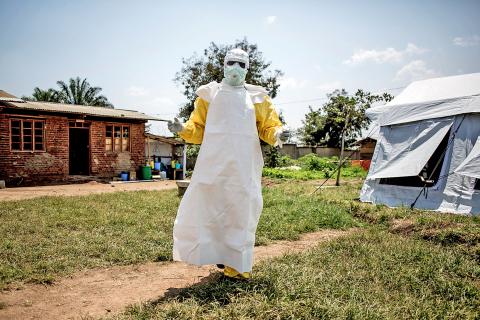
Photo: AFP
It developed into two full-fledged wars that sucked in countries around eastern and southern Africa, claiming millions of lives.
Today, the fighting continues at a lower intensity and without direct foreign involvement.
However, it still reaps a near-daily harvest of killings, rape, maimings and torched villages, coinciding with an ongoing outbreak of Ebola — a mix that adds perilously to the DR Congo’s instability.
“The conflict is deliberately being forgotten or played down by the international community, which is showing a kind of willful blindness,” said Omar Kavota, head of the Centre of Studies for Peace, Democracy and Human Rights (CEPADHO), a not-for-profit group based in the province of North Kivu.
The bloodshed is mainly blamed on militias derived from ethnic groups, many of which fight over Kivu’s natural resources — a traffic in so-called “blood minerals” that include coltan, a metallic ore vital for mobile phones and electric cars.
According to the Congo Research Group, a study project at New York University, 134 armed groups are active in North and South Kivu, the region’s two provinces.
In August alone, it counted 49 violent deaths, 103 kidnappings and 32 clashes.
On Saturday, 21 people were killed in the city of Beni by assailants wielding guns and machetes, prompting aid workers to suspend efforts to roll back an outbreak of deadly Ebola. Two days later, one person was killed and 17 kidnapped in Oicha, a town 30km to the south.
Authorities have said the attack was the work of the Allied Democratic Forces (ADF), a group rooted in Ugandan Islamism that has killed hundreds of Kivu civilians since its creation in 1995.
The ADF is under UN sanctions.
Kivu, a region bigger than Portugal that borders Burundi, Rwanda, Tanzania and Uganda, spiraled into catastrophe in 1994.
Hundreds of thousands of Rwandan Hutus streamed across the border, fearing reprisals after hardline Hutus were ousted from power following a genocide of Tutsis and Hutu moderates.
Two years later, the first war flared in the DR Congo. Rwanda’s new strongman, Paul Kagame, a Tutsi, backed a campaign by rebel Laurent-Desire Kabila to overthrow dictator Mobutu Sese Seko.
Kagame’s forces entered the DR Congo to settle scores with Hutus who had taken part in the genocide, but civilian refugees — “between 200,000 and 300,000,” according to Belgian writer David van Reybrouck — were the main victims.
Once in power, Kabila turned against his Rwandan and Ugandan allies, expelling their forces from the country and the second war ensued in the DR Congo.
Nine African countries and more than two dozen armed groups became embroiled in the conflict, which by some estimates caused more than 5 million deaths from violence, disease and starvation.
Some historians have dubbed the conflict: “The Great War of Africa.”
The war formally ended in 2003, but its embers still glow brightly, stirring fears that they could be easily fanned back into greedy flames.
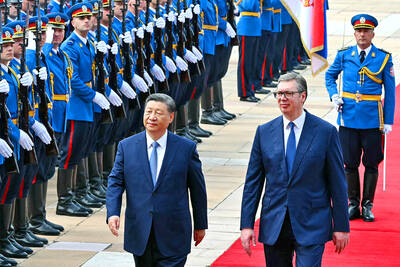
MONEY MATTERS: Xi was to highlight projects such as a new high-speed railway between Belgrade and Budapest, as Serbia is entirely open to Chinese trade and investment Serbian President Aleksandar Vucic yesterday said that “Taiwan is China” as he made a speech welcoming Chinese President Xi Jinping (習近平) to Belgrade, state broadcaster Radio Television of Serbia (RTS) said. “We have a clear and simple position regarding Chinese territorial integrity,” he told a crowd outside the government offices while Xi applauded him. “Yes, Taiwan is China.” Xi landed in Belgrade on Tuesday night on the second leg of his European tour, and was greeted by Vucic and most government ministers. Xi had just completed a two-day trip to France, where he held talks with French President Emmanuel Macron as the
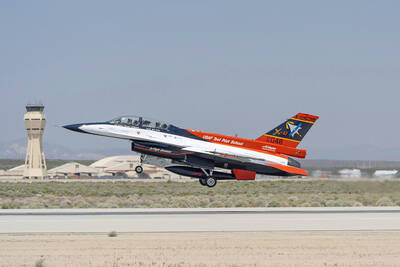
With the midday sun blazing, an experimental orange and white F-16 fighter jet launched with a familiar roar that is a hallmark of US airpower, but the aerial combat that followed was unlike any other: This F-16 was controlled by artificial intelligence (AI), not a human pilot, and riding in the front seat was US Secretary of the Air Force Frank Kendall. AI marks one of the biggest advances in military aviation since the introduction of stealth in the early 1990s, and the US Air Force has aggressively leaned in. Even though the technology is not fully developed, the service is planning
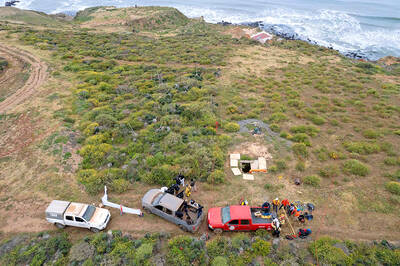
INTERNATIONAL PROBE: Australian and US authorities were helping coordinate the investigation of the case, which follows the 2015 murder of Australian surfers in Mexico Three bodies were found in Mexico’s Baja California state, the FBI said on Friday, days after two Australians and an American went missing during a surfing trip in an area hit by cartel violence. Authorities used a pulley system to hoist what appeared to be lifeless bodies covered in mud from a shaft on a cliff high above the Pacific. “We confirm there were three individuals found deceased in Santo Tomas, Baja California,” a statement from the FBI’s office in San Diego, California, said without providing the identities of the victims. Australian brothers Jake and Callum Robinson and their American friend Jack Carter
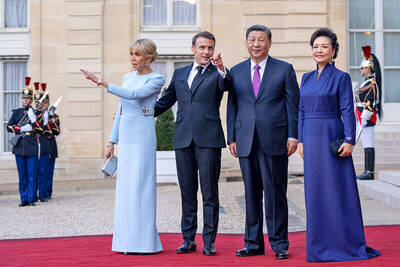
CUSTOMS DUTIES: France’s cognac industry was closely watching the talks, fearing that an anti-dumping investigation opened by China is retaliation for trade tensions French President Emmanuel Macron yesterday hosted Chinese President Xi Jinping (習近平) at one of his beloved childhood haunts in the Pyrenees, seeking to press a message to Beijing not to support Russia’s war against Ukraine and to accept fairer trade. The first day of Xi’s state visit to France, his first to Europe since 2019, saw respectful, but sometimes robust exchanges between the two men during a succession of talks on Monday. Macron, joined initially by EU Commission President Ursula von der Leyen, urged Xi not to allow the export of any technology that could be used by Russia in its invasion